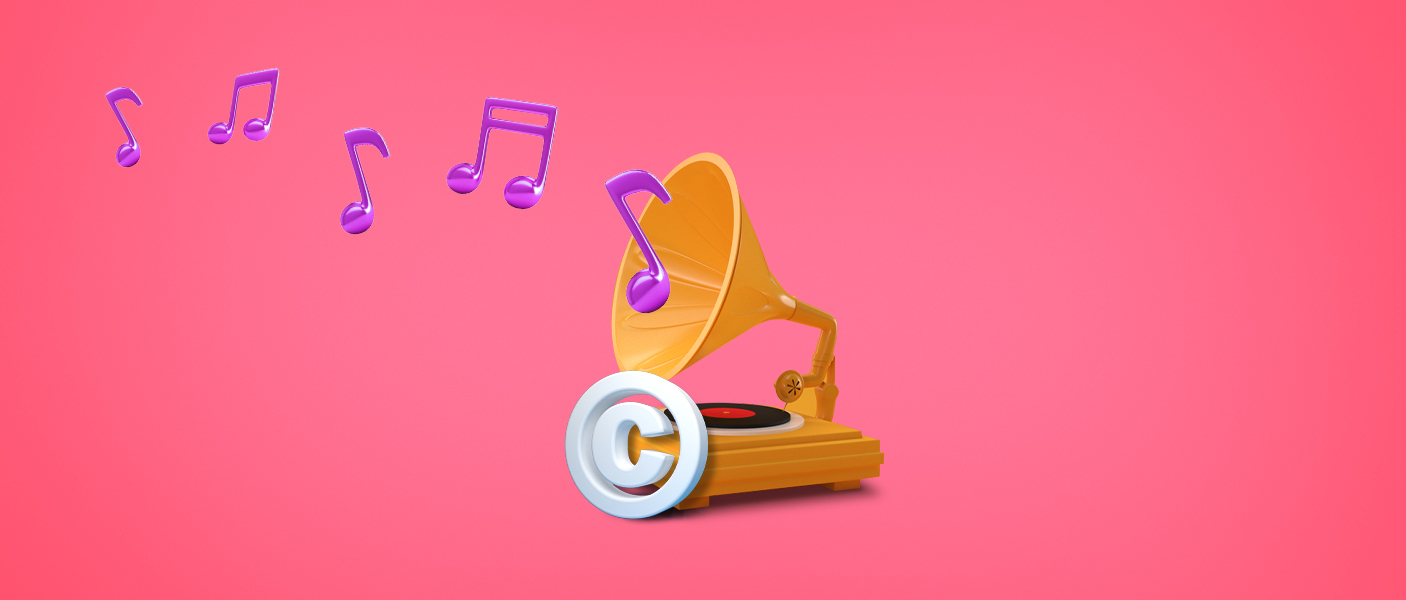Guide to Copyright a Song in India: Do’s and Don’ts
October 12, 2022 By Dinesh ParmarIf you don't want your original composition to be modified without your consent or giving your credits, here's a quick guide to how to copyright a song in India.
You might be well aware of the recent online tussle between noted singers Neha Kakkar and Falguni Pathak over the recreation of the latter's hit 90s original track "Maine Payal Hai Chhankai" by the former. While the veteran singer expressed her wish to take legal action against Neha Kakkar due to the fact that neither the makers nor Neha reached out to her before or after the new song was released, she said she couldn't, since she was not in possession of the song rights.
Did you understand what we are trying to point out by mentioning the recent word battle between the two singers? The importance of Copyrights. If you have it you are legally powerful to take any action against any copycats; if not, you can do nothing but watch your creation being misused.
Indian Music Industry and its Remakes
‘Tamma Tamma,’ ‘Bachna Ae Haseeno,’ ‘Seeti Maar,’ ‘Tip Tip Barsa,’ ‘Muqabla’... the list goes on. Every other day, a new version of an iconic song from the ‘80s or ‘90s is released and while some of them manage to top the charts, some just break our hearts. Looking at the trend of such remakes, the thought might have crossed your mind - who gives them the right to do so? Well, that right is called Copyright.
What is Copyright Law?
Copyright law is like a mark you can leave on your creation be it music, art, drama, or literary work to establish that you own them and have exclusive right to copy, distribute, adapt, display, and perform that work.
A type of Intellectual Property (IP), the Indian Copyright Act was first enforced in 1914 but it was based on the United Kingdom Copyright Act of 1911, after which, new legislation was introduced in 1957 which altogether came to be known as the Copyright Act, 1957.
Why is it Necessary to Copyright Your Creative Work?
We all know how much painstaking effort one has to put into composing and producing a creative work like - a song. To make it sound unique and original, a lot of talent, time, and resources are required which is not something that everyone can do. Now imagine, after numerous failures, you finally composed a song, and later someone uses or copies your creation without giving you due credit. That’s like stabbing your heart, isn’t it? To avoid that, very pain, you need to copyright your creation or else you might not have the voice enough like the legendary singer Falguni Pathak to battle once your song has been misused.
Moreover, by copyrighting your song, you also get the benefit of taking legal action against those who violate it. With your copyright registration certificate, you can file a civil suit against the offender and can also get royalties if you want, for any kind of production is to be done based on your copyrighted work.
In addition to that, it also gives you economic benefits by entitling you to use your work in various ways like making copies, performing in public, broadcasting your work, etc, and availing appropriate rewards for it as well as selling or passing it to someone. It also gives you the right to revise or update your work as and when you desire.
What is Copyright Registration?
To protect your originally composed song from infringement, you must do your copyright registration which is nothing but the filing of an intellectual property right that declares the ownership of you (artist/creator) over your creation.
Now when we say a song then you must be aware that there to make a song complete as a whole, a lot of elements are combined together. First of all, lyrics are penned down by a lyricist, then music is given to the words by the composer of the song, after which a singer gives his/her voice to that lyrics and gets it recorded in a studio, the producer then further decide to film it with the singer itself or with various actors and performers to release it officially. In short, behind the composition of a song, there’s a whole crew that works in sync and hence one must never skip the thought of copyrighting a song due to any reason.
So, let’s see the steps you need to follow to copyright a song in India.
How to Copyright A Song in India?
Anyone who is the author of the song, one who has the exclusive rights of the song, a copyright claimant (the author, or a person/organization that has obtained ownership rights from the author through a written contract, will, etc.), or an authorized agent (a person authorized to act on behalf of the author/ the copyright claimant/ the owner of an exclusive right) are eligible to apply for copyright registration.
Now, to apply, first of all, you will require the following documents to begin your copyright registration process.
- A NOC (No Objection Certificate) of the publisher/producer/author/composer and all other members of your crew who were involved in the making of the song;
- 3 copies of the work if published; 2 copies of manuscripts if not published;
- A description of the title and language of the work;
- A document containing the personal information of the applicant.
Once you have gathered the documents, you can start following the below-mentioned procedure to get the copyright certificate for your original composition.
Step 1: File and submit your application
- For copyright registration, download and fill up the application Form XIV with the correct details through the portal of the Copyright Office Government of India or you can seek the help of a copyright law firm to do the same without any errors and to avoid rejections.
- Submit the form along with the required documents and prescribed fee via the online portal.
- Once submitted you will receive a diary number which can be used to track the status of your application. You must also 1 hard copy (print) of the “Acknowledgement Slip” and 1 hard copy (print) of the “Copyright Registration Form”, and send it by post to the Registrar of Copyrights (“Registrar”) to complete your application filing as a whole.
Step 2: Wait for verification
- After the successful filing of the application and submission of work, your application will be sent to the examiner of Copyrights for a formality check to ensure that your application has met all requisite criteria needed for copyright registration, the waiting period for which is a minimum of 30 days.
- If zero discrepancies are found, your application will be accepted and if it fails, a letter of discrepancy asking for providing further details or justifications will be delivered to you and based on your reply, the Registrar will conduct the hearing to resolve the discrepancy.
- If any objections are raised against your application, you will be required to file legal reverts within due time. Whereas, if your application faces opposition, letters will be sent to both parties and an inquiry will be held. The Registrar will then summon them for a hearing and based on the inquiry, the Registrar will decide whether to enter the particulars in his Register or not.
- In case the discrepancy is not resolved even after the hearing, the application will be rejected and a rejection letter is sent to the applicant.
Step 3 - Receive the permission
- In the final step of the registration process when the application will reach the Registrar, you might be asked to submit more documents if required.
- Once completely satisfied with the copyright claim made by you, the Registrar of Copyrights will enter the details of the copyright into the register of copyrights and issue a certificate of registration - the Extracts of the Register of Copyrights (ROC), after signing it which then will give you the complete legal rights over your song.
Duration and Violation of Copyright Protection Under the Copyright Act 1957
The copyright protection for a musical work is valid for sixty years from the date of its publication or for the lifetime of the author and sixty years from the date of the author’s death as per the copyright law in India. Whereas, a sound recording is valid for sixty years from the start of the calendar year following the year in which it is published. While for the performer’s or the singer’s rights in a song the copyright validity is of fifty years starting from the next year in which the performance is given.
In case of any violation or infringement, The Copyright Act 1957 provides three kinds of remedies from which the copyright holder can benefit and they are as follows:
Civil remedies - provided under Chapter XII of the Copyright Act 1957 which includes remedies for injunctions, damages, the account of profits, delivery of infringing copy, and damages for conversion.
Criminal remedies - provided under Chapter XIII of the statute which allows imprisonment of the accused (up to 3 years) or imposition of fine (up to 200,000 Rupees) or both as well as seizure of infringing copies.
Administrative remedies - provided under the statute which include detention of the infringing goods by the customs authorities.
Bottom Line
If someone is messing with your creation, it is a serious and punishable offense that you must be aware of and the same applies to you too. Before using any song for your purpose, seek permission or give credit to the creator to stay safe.
Remember, copyright law in India is established to protect our creativity and one must make use of it. So, if you need help in getting your copyright or want advice from the experts, Parker and Parker Co. LLP is the best and right copyright law firm in India to reach out. So, get in touch for all your copyright registration needs today.






